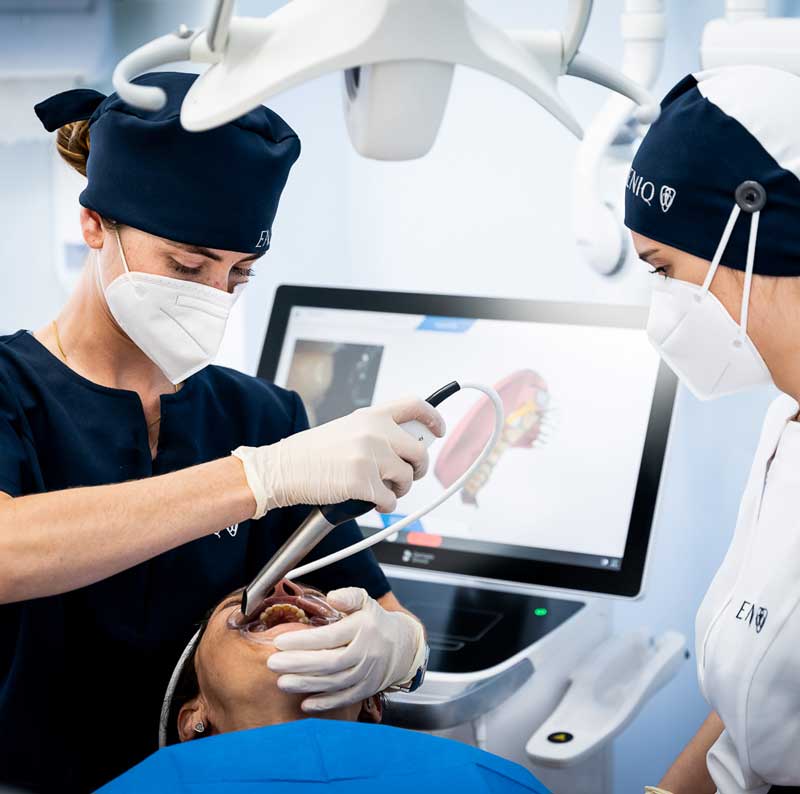

Wisdom Teeth
ENIQ Madrid, experts in wisdom tooth extraction.
What are Wisdom Teeth?
Wisdom teeth, also known as third molars, are the last teeth to develop in human dentition. They usually appear between the ages of 17 and 25, although this can vary from person to person.
In total, a person can have up to four wisdom teeth, one in each corner of the mouth: two in the upper jaw and two in the lower jaw. However, some people may not develop any wisdom teeth, or they may have fewer than four.
Wisdom teeth often cause problems because, in many cases, there is not enough space in the mouth for them to develop properly. This can lead to wisdom teeth becoming impacted or only partially erupting, resulting in pain, inflammation, infection, and other dental issues.
Since wisdom teeth can cause discomfort and dental problems, it is common for their removal to be recommended. Wisdom tooth extraction is performed through a dental procedure, generally with local or general anesthesia, depending on the case. The dentist will assess the position of the wisdom teeth and determine if they need to be extracted.
It is important to regularly consult a dentist to monitor the development and position of wisdom teeth, and make informed decisions about their extraction if necessary.
What is the Procedure for Removing Wisdom Teeth?
The procedure for extracting wisdom teeth can vary depending on the position and condition of the teeth, as well as the dentist's preference. Below, I'll provide a general overview of the typical process:
Initial Evaluation: The dentist will perform an evaluation of your wisdom teeth using X-rays and examining your mouth. This will help them determine the position of the teeth, whether they are impacted, or if they can cause problems. 3D X-ray to assess anatomical compromises.
Anesthesia: Before beginning the extraction, local anesthesia will be administered to numb the area of the mouth where the procedure will be performed. In some cases, general anesthesia may be chosen, especially if multiple wisdom teeth are to be removed or if there are complications.
Incision and Tissue Separation: The dentist will make a small incision in the gum tissue covering the wisdom tooth. In some cases, it may be necessary to remove part of the bone surrounding the tooth to facilitate its extraction.
Extraction of the Tooth: Once access to the wisdom tooth is gained, the dentist will carefully extract it from the bone socket using specialized dental tools. In some cases, it may be necessary to divide the tooth into smaller sections to facilitate its removal.
Cleaning and Suture: After extracting the wisdom tooth, the area will be thoroughly cleaned to remove any remaining tissue or bone. In some cases, suturing may be required to close the incision in the gums. The dentist will use sutures that dissolve on their own within a few days or sutures that need to be removed during a follow-up visit.
Recovery: Specific post-procedure care instructions will be provided, such as using cold compresses to reduce swelling, taking pain relievers for discomfort, and adopting a soft diet for a few days. Medications may be prescribed to control pain and prevent infections.
It is important to note that wisdom tooth extraction can vary in each case, and your dentist will provide specific instructions and recommendations based on your dental situation. If you have any doubts or concerns, it is best to discuss them directly with your dentist before the procedure.
Information
Is it Always Necessary to Extract Wisdom Teeth?
It is not always necessary to extract wisdom teeth. The decision to extract or not depends on several factors, such as the position of the teeth, whether they are causing problems, or if there is a risk of them causing problems in the future. Some people have enough space in their mouth, and their wisdom teeth erupt properly without causing complications. In these cases, extraction is not necessary.
However, in many cases, wisdom teeth can cause dental and oral health problems. Some of the situations where the extraction of wisdom teeth is recommended are:

Reasons for Extracting Wisdom Teeth:
- Impaction: If wisdom teeth do not have enough space to fully erupt or are growing in the wrong position, they can become impacted or partially erupted. This can result in pain, inflammation, infection, damage to adjacent teeth, and other dental issues.
- Difficulty Cleaning: Due to their location in the back of the mouth, wisdom teeth are often difficult to reach and clean properly. This can lead to the buildup of bacterial plaque, formation of cavities, and gum diseases.
- Displacement of Adjacent Teeth: Wisdom teeth can exert pressure on adjacent teeth as they try to emerge, which can cause dental crowding and misalignment.
- Cysts or Tumors: In rare cases, wisdom teeth can form cysts or tumors around them. This can damage the bones, teeth, and surrounding tissues.
The decision to extract wisdom teeth will be based on an individual assessment of each patient by the dentist. If there is a risk of complications or future problems, the dentist may recommend preventive extraction of the wisdom teeth before symptoms or more serious complications arise.
It is important to talk with your dentist and receive a personalized evaluation to determine whether it is necessary to extract the wisdom teeth in your specific case.

Is it True That Wisdom Teeth Crowd Teeth?
The claim that wisdom teeth can crowd teeth is a widely debated topic in the dental community. Some experts believe that wisdom teeth can exert pressure on adjacent teeth as they try to emerge, which may result in dental crowding. Other experts argue that dental crowding is a natural process and is not necessarily related to wisdom teeth.
Dental crowding can have various causes, such as genetic factors, lack of space in the jaw, poor sucking habits, changes in oral musculature, and other factors. Wisdom teeth are often cited as a possible cause of crowding, as their eruption can coincide with the time when the anterior teeth are already in place, and the lack of space can cause the teeth to bunch up or shift.
However, several scientific studies have shown that not all people with wisdom teeth develop dental crowding. Additionally, some people who do not have wisdom teeth can also experience dental crowding. This suggests that dental crowding can have multiple causes and is not limited exclusively to the presence of wisdom teeth.
Ultimately, the relationship between wisdom teeth and dental crowding can vary from person to person. It is important to receive a professional dental evaluation to determine the underlying causes of dental crowding and establish an appropriate treatment plan. Your dentist will be able to assess the position of your teeth, the presence of wisdom teeth, and other relevant factors to provide you with specific guidance on your dental situation.
What are the Benefits of Undergoing Wisdom Tooth Extraction at ENIQ?
Technology has advanced in the field of dentistry, and different techniques and tools are now used to perform wisdom tooth extraction more safely and efficiently. Some of the benefits of using technology in the wisdom tooth extraction procedure include:
- Better Precision: Technological advancements, such as digital radiography and computed tomography, allow for better visualization of the position and structure of wisdom teeth. This assists the dentist in planning the procedure more accurately, avoiding damage to adjacent structures, such as nerves or bone.
- More Precise Anesthesia: The use of technology-assisted anesthesia techniques, like computerized anesthesia or ultrasound-guided anesthesia, allows for the exact amount of anesthesia to be administered to the affected area. This can improve patient comfort and reduce the risk of side effects.
- Shorter Recovery Time: Some technology-assisted wisdom tooth extraction techniques, such as computer-assisted surgery or surgical guides, can allow for a more precise and less invasive procedure. This can result in less manipulation of the surrounding tissues and consequently, a quicker recovery time and less postoperative discomfort.
- Reduction of Complications: With the use of advanced technology, dentists can assess and plan the extraction procedure more accurately, reducing the risk of complications during surgery. Additionally, specialized tools like dental lasers can be used to reduce bleeding and accelerate healing.
- Greater Comfort for the Patient: Technological advancements in dentistry aim to improve the patient's experience. This may include the use of needleless anesthesia systems, conscious sedation techniques, or virtual reality assistance to reduce anxiety and stress associated with the procedure.
It's important to note that not all cases of wisdom tooth extraction will require advanced technology, and each patient is individually assessed by the dentist. Technology is a tool that can enhance the precision and efficiency of the procedure, but the dentist's experience and skill are also key factors for a successful outcome.
How Much Does Wisdom Tooth Extraction Cost?
The price for extracting third molars ranges from €80 to €500 depending on the difficulty of the extraction and the state of the surrounding tissues. In Spain, you can have them removed for free through the public health system.
Never forget that the best way to save money at the dentist is prevention, and after the treatment, attend your check-ups, annual cleaning, and maintenance. Follow strict oral hygiene norms such as brushing three times a day, using dental floss at night, and using oral irrigators with mouthwashes that contain fluoride and components that prevent plaque and seal the dental structure, defending it from the acidity of food.
Wisdom Tooth Extraction
Surgical Procedure
*subject to specialist assessment
Experience a specialized and precise treatment designed for the safe and efficient extraction of wisdom teeth, ensuring your comfort and well-being throughout the procedure.
-
All-Inclusive
Frequently Asked Questions
Do you have more questions about the procedure for wisdom tooth extraction?
Recovery time varies, but generally, discomfort lasts for a few days and complete healing may take several weeks.
In some cases, yes. However, the number to be extracted will depend on the dentist's assessment and the comfort of the patient.
Rarely, complications can arise such as nerve damage, bone fractures, or healing problems.
Services
All rights reserved © ENIQ Clinic 2025
Legal Notice · Privacy Policy · Cookie Policy
